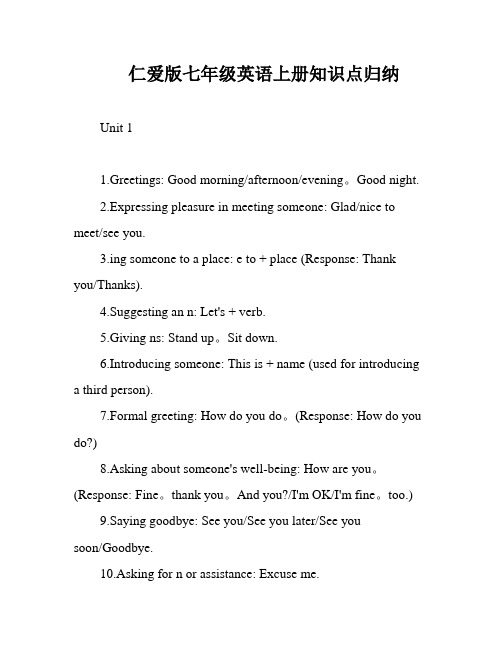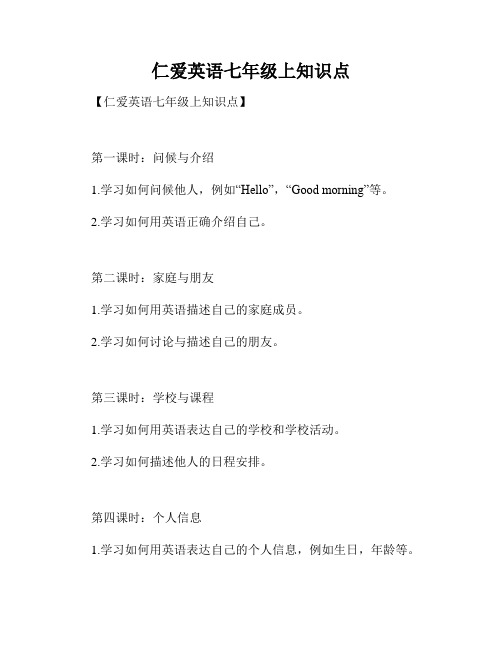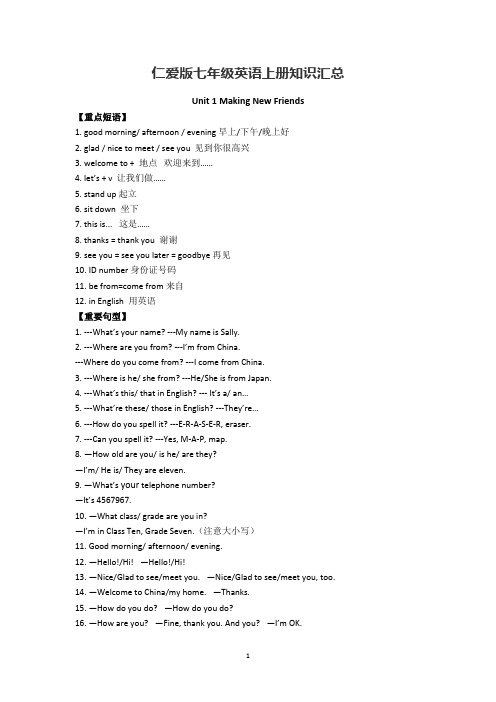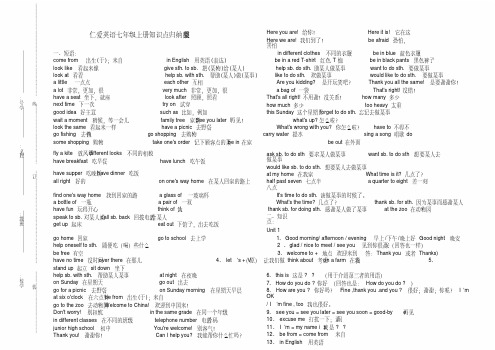仁爱英语七年级上册知识点归纳完整版知识分享
仁爱英语七年级(上册)知识点归纳

仁爱英语七年级(上册)知识点归纳仁爱英语七年级上册知识点归纳Unit 1一.常用表达法1. Good morning/ afternoon / evening 早上/下午/晚上好Good night 晚安(晚上告别)2. Glad / nice to meet / see you 见到你很高兴(回答也一样)例:-Nice to meet you. -Nice to meet you, too.3. Welcome to + 地点欢迎来到……(回答:Thank you 或者Thanks)注意:如果地点是here或者there就不能用to.4. This is...... 这是……(用于介绍第三者的用语)5. How do you do ?你好(回答也是:How do you do ? )6. Stand up 起立Sit down 坐下7. -How are you ? 你好吗?-Fine\Not bad\Verywell ,thank you .and you ?很好;谢谢;你呢? -I’m OK / I’m fine , too . 我也很好。
8. See you = Bye = Goodbye 再见9. -Here you are. 给你。
-Thank you. 谢谢。
10. excuse me. 打扰一下;请问 Excuse me, are you Jane?11. I’m-----= my name is ---- 我是...... She’s…=Her name is…她是......He’s……=His name is … 他是...... 例:-My name is Michael./ I’m Michael.12. be from = come from 来自●用be from 时要注意与前面人称搭配,用不同的be 动词He/She/It is from China. They/We/You are from China. I’m from China.●用come from时,要注意与第三人称进行搭配时用comes。
七年级英语上册知识点归纳仁爱版

Unit1 Topic 1 Hello!词汇和重点句型:1. Excuse me! 对不起,打扰了!(用在事情发生之前)Sorry! 对不起(用在事情发生之后)2. Nice to meet / see you. = Glad to meet / see you. 很高兴见到你。
3. Welcome to China / Fuzhou / Changle! 欢迎你到中国/福州/长乐来!4. What’s your name? 你叫什么名字?(常用于官方或者对小孩子说话)My name is Maria. = I am Maria. 我叫Maria。
5. Stand up. 起立。
Sit down. 坐下。
(反义词)6. How do you do? How do you do? 你好!你好!(初次见面时打招呼使用)7. Have a nice day! You, too. 祝您一天愉快!您也是!8. How are you? 你身体好吗?I’m fine / OK / well. Thanks. 我很好,谢谢!(可以缩略为:Fine, thank you.)Not bad, thanks. 不错,谢谢!9. See you later! = See you soon! 等会儿见!See you tomorrow! 明天见!Good-bye! == Bye-bye! = Bye! 再见!10. This is Mary. This is Tom. 这是Mary. 这是Tom. (用于第三者介绍他人时)语言点:1. Good morning. 一般用于黎明时到中午十二点之前Good afternoon. 一般用于中午十二点以后到下午六点。
Good evening. 一般用于下午六点到晚上十点左右。
Good night. 一般用于睡觉前,表示"晚安"。
Good day. 一般在白天问好时用,表示"日安",尤其是澳大利亚和美国英语中使用较多。
仁爱版七年级英语上册知识点归纳

仁爱版七年级英语上册知识点归纳Unit 11.Greetings: Good morning/afternoon/evening。
Good night.2.Expressing pleasure in meeting someone: Glad/nice to meet/see you.3.ing someone to a place: e to + place (Response: Thank you/Thanks).4.Suggesting an n: Let's + verb.5.Giving ns: Stand up。
Sit down.6.Introducing someone: This is + name (used for introducinga third person).7.Formal greeting: How do you do。
(Response: How do you do?)8.Asking about someone's well-being: How are you。
(Response: Fine。
thank you。
And you?/I'm OK/I'm fine。
too.)9.Saying goodbye: See you/See you later/See yousoon/Goodbye.10.Asking for n or assistance: Excuse me.11.Introducing oneself: I'm + name.12.Origin: Be from/Come from.nguage: In English.14.Spelling: Can you spell it。
(Response: Yes/No).15.Responding to thanks: That's OK/That's all right/You'ree/Not at all.16.Age:。
仁爱英语七年级上知识点

仁爱英语七年级上知识点【仁爱英语七年级上知识点】第一课时:问候与介绍1.学习如何问候他人,例如“Hello”,“Good morning”等。
2.学习如何用英语正确介绍自己。
第二课时:家庭与朋友1.学习如何用英语描述自己的家庭成员。
2.学习如何讨论与描述自己的朋友。
第三课时:学校与课程1.学习如何用英语表达自己的学校和学校活动。
2.学习如何描述他人的日程安排。
第四课时:个人信息1.学习如何用英语表达自己的个人信息,例如生日,年龄等。
2.学习如何讨论并描述他人的个人信息。
第五课时:购物与饮食1.学习如何用英语购买物品,例如面包,牛奶等。
2.学习如何用英语点餐并描述自己喜欢的食物。
第六课时:活动与爱好1.学习如何用英语描述自己的爱好以及自己参与的活动。
2.学习如何讨论他人的爱好以及他们参加的活动。
第七课时:时间与日期1.学习如何用英语表达时间和日期。
2.学习如何预定约会并记录重要日期,例如约会,生日等。
第八课时:天气与季节1.学习如何用英语表达天气和季节。
2.学习如何描述他人的天气和季节体验。
第九课时:交通工具1.学习如何用英语描述常见的交通工具,例如自行车,汽车以及公共交通工具。
2.学习在英语中请求帮助和指示方向。
第十课时:健康与生活方式1.学习如何用英语描述健康和生活方式,例如进行体育锻炼,不吃垃圾食品等。
2.学习如何讨论他人的健康状况和生活方式。
以上就是仁爱英语七年级上的主要知识点,掌握这些知识点将使你更自信地用英语与他人交流。
希望你能够认真学习并用英语学习更多的知识点。
仁爱版七年级英语上册知识汇总(最新版)

仁爱版七年级英语上册知识汇总Unit 1 Making New Friends【重点短语】1. good morning/ afternoon / evening 早上/下午/晚上好2. glad / nice to meet / see you 见到你很高兴3. welcome to + 地点欢迎来到……4. let’s + v让我们做……5. stand up 起立6. sit down 坐下7. this is... 这是……8. thanks = thank you 谢谢9. see you = see you later = goodbye 再见10. ID number 身份证号码11. be from=come from 来自12. in English 用英语【重要句型】1. ---What’s your name? ---My name is Sally.2. ---Where are you from? ---I’m from China.---Where do you come from? ---I come from China.3. ---Where is he/ she from? ---He/She is from Japan.4. ---What’s this/ that in English? --- It’s a/ an…5. ---What’re these/ those in English? ---They’re…6. ---How do you spell it? ---E-R-A-S-E-R, eraser.7. ---Can you spell it? ---Yes, M-A-P, map.8. —How old are you/ is he/ are they?—I’m/ He is/ They are eleven.9. —What’s your telephone number?—It’s 4567967.10. —What class/ grade are you in?—I’m in Class Ten, Grade Seven.(注意大小写)11. Good morning/ afternoon/ evening.12. —Hello!/Hi! —Hello!/Hi!13. —Nice/Glad to see/meet you. —Nice/Glad to see/meet you, too.14. —Welcome to China/my home. —Thanks.15. —How do you do? —How do you do?16. —How are you? —Fine, thank you. And you? —I’m OK.17. —See you then/ later. —See you.18. —Goodbye. —Bye.19. —Thank you. —You’re welcome./That’s OK./Not at all.【重点语法】1. 元音字母:Aa Ee Ii Oo Uu包含有以下元音的字母:[e] Aa Hh Jj Kk[i:] Ee Bb Cc Dd Gg Pp Tt Vv[aɪ] Ii Yy[ju:] Uu Qq Ww[e] Ff Ll Mm Nn Ss Xx Zz2. 大小写句首字母,人名,地名,称呼语,专有名词,星期的首字母要大写,引人注意。
仁爱版七年级上册英语全册知识点总结

考点一 thank的用法 【课文原句】 Thank you. 谢谢你。(七上P1) thank常用在日常交际中,表示对对方的感激之情。其常用 句型为thank sb. for (doing) sth.“因(做)某事而感谢某人”, 相当于“thanks for (doing) sth.”。
单项选择 4.(2019·预测)—Hello, this is Tina speaking. Is that Sam? —Sorry, he isn't here at this moment. _A__? A.Can I take a message B.What are you saying to Tina C.May I speak to Sam D.What's that speaking
【拓展】
词汇 helpful helpless
含义
用法
有帮助的;有用的
be helpful to...“对……有用 ”
feel helpless“感到无能为力 无助的;无法抑制的
”
用适当的介词填空 13.Bill has made great progress _w__it_h_ the help of his teacher.
单项选择
7.(2018·安徽中考)—Will you go to the picnic this Saturday?
—I'd like to, _A__ I'll have to help look after my baby sister.
A.but
B.or
C.and
D.so
8.(2018·湖北襄阳中考)—Be quick, _C__ we'll fail to catch
仁爱英语七年级上册知识点归纳完整版

仁爱英语七年级上册知识点归纳完整版Here you are! 给你!Here it is! 它在这Here we are! 我们到了!be afraid 恐怕,害怕一、短语:in different clothes 不同的衣服be in blue 蓝色衣服come from 出生(于);来自in English 用英语(表达) be in a red T-shirt 红色 T 恤be in black pants 黑色裤子look like 看起来像give sth. to sb. 把(某物)给(某人) help sb. do sth.助某人做某事want to do sth. 要做某事look at 看着help sb. with sth. 帮助(某人)做(某事) like to do sth. 欢做某事would like to do sth. 要做某事a little 一点点each other 互相Are you kidding? 是开玩笑吧?Thank you all the same! 是要谢谢你!a lot 非常,更加,很very much 非常,更加,很 a bag of一袋That's right!没错!:号学线have a seat坐下,就座look after 照顾,照看next time 下一次try on 试穿good idea 好主意such as 比如,例如That's all right!不用谢!没关系!how many多少how much多少too heavy太重this Sunday这个星期日forget to do sth.忘记去做某事wait a moment 稍候,等一会儿family tree 家谱S ee you later再!见!what's up?怎么啦?look the same 看起来一样have a picnic 去野餐What's wrong with you?你怎么啦?have to不得不go fishing 去钓鱼go shopping 去购物carry water提水sing a song唱歌 do some shopping购物take one's order记下顾客点的菜be in 在家be out在外面:名姓fly a kite 放风筝different looks 不同的相貌have breakfast吃早餐have lunch 吃午饭ask sb. to do sth要. 求某人做某事want sb. to do sth想.要某人去做某事would like sb. to do sth.想要某人去做某事订have supper吃晚饭have dinner 吃饭all right 好的on one's way home 在某人回家的路上at my home在我家What time is it?几点了?half past seven七点半 a quarter to eight差一刻八点find one's way home 找到回家的路 a glass of 一玻璃杯It's time to do sth.该做某事的时候了。
(完整版),新版仁爱英语七年级上册知识点归纳,推荐文档

仁爱英语七年级上册知识点归纳Unit 1 Making New Friends一、元音字母:Aa Ee Ii Oo Uu包含有以下元音的字母:[e] Aa Hh Jj Kk [i:] Ee Bb Cc Dd Gg Pp Tt Vv [aɪ] Ii Yy[ju:] Uu Qq Ww [e] Ff Ll Mm Nn Ss Xx Zz二、大小写句首字母,人名,地名,称呼语,专有名词,星期的首字母要大写,引人注意。
•Look!Is that Jane?•He comes from Hubei, China.•Mr. Wang, this is my mom.•What class are you in?—I’m in Class Ten, Grade Seven.•On Sunday, we go to the West Hill for a picnic.三、问候语1.Good morning/ afternoon/ evening.2.Hello!/ Hi! ---Hello!/ Hi!3.Nice/ Glad to see/ meet you. ---Nice/ Glad to see/ meet you, too.4.Welcome to China/ my home. ---Thanks.5.How do you do? ---How do you do?6.How are you? ---Fine, thank you. And you? ---I’m OK.7.See you then/ later. ---See you.8.Goodbye. ---Bye.9.Thank you. ---Yo u’re welcome./ That’s OK./ Not at all.四、数字句型1.How old are you/ is he/ are they? ---I’m/ He is/ They are eleven.2.What’s your telephone number? ---It’s 4567967.3.What class/ grade are you in? --- I’m in Class Ten, Grade Seven.(注意大小写)五、重要句型及短语1.What’s your name? ---My name is Sally.2.Where are you from? ---I’m from China.Where do you come from? ---I come from China.3.Where is he/ she from? ---He/She is from Japan.4.What’s this/ that in English? --- It’s a/an……5.What’re these/ those in English? ---They’re……6.How do you spell it? ---E-R-A-S-E-R, eraser.7.Can you spell it? ---Yes, M-A-P, map.六、Be 动词的用法•我用am,你用are,is 用于他、她、它,单数用is,复数就用are。
- 1、下载文档前请自行甄别文档内容的完整性,平台不提供额外的编辑、内容补充、找答案等附加服务。
- 2、"仅部分预览"的文档,不可在线预览部分如存在完整性等问题,可反馈申请退款(可完整预览的文档不适用该条件!)。
- 3、如文档侵犯您的权益,请联系客服反馈,我们会尽快为您处理(人工客服工作时间:9:00-18:30)。
学校:班级:姓名:学号:装订线仁爱英语七年级上册知识点归纳完整版一、短语:come from 出生(于);来自in English 用英语(表达)look like 看起来像give sth. to sb. 把(某物)给(某人)look at 看着help sb. with sth. 帮助(某人)做(某事) a little 一点点each other 互相a lot 非常,更加,很very much 非常,更加,很have a seat 坐下,就座look after 照顾,照看next time 下一次try on 试穿good idea 好主意such as 比如,例如wait a moment 稍候,等一会儿family tree 家谱look the same 看起来一样have a picnic 去野餐go fishing 去钓鱼go shopping 去购物do some shopping 购物take one's order 记下顾客点的菜fly a kite 放风筝different looks 不同的相貌have breakfast 吃早餐have lunch 吃午饭have supper 吃晚饭have dinner 吃饭all right 好的on one's way home 在某人回家的路上find one's way home 找到回家的路 a glass of 一玻璃杯a bottle of 一瓶 a pair of 一双have fun 玩得开心think of 认为speak to sb. 对某人说call sb. back 回拨电话给某人get up 起床eat out 下馆子,出去吃饭go home 回家go to school 去上学help oneself to sth. 随便吃(喝)些什么be free 有空have no time 没时间over there 在那儿think about 考虑on a farm 在农场help sb. with sth. 帮助某人某事at night 在夜晚on Sunday 在星期天go out 出去go for a picnic 去野餐on Sunday morning 在星期天早晨at six o'clock 在六点钟be from 出生(于);来自go to the zoo 去动物园Welcome to China! 欢迎到中国来!Don't worry! 别担忧!in the same grade 在同一个年级in different classes 在不同的班级telephone number 电话号码junior high school 初中You're welcome! 别客气!Thank you! 谢谢你!Can I help you? 我能帮你什么忙吗?Here you are! 给你!Here it is! 它在这Here we are! 我们到了!be afraid 恐怕,害怕in different clothes 不同的衣服be in blue 蓝色衣服be in a red T-shirt 红色T 恤be in black pants 黑色裤子help sb. do sth. 助某人做某事want to do sth. 要做某事like to do sth. 欢做某事would like to do sth. 要做某事Are you kidding? 是开玩笑吧?Thank you all the same! 是要谢谢你!a bag of 一袋That's right!没错!That's all right!不用谢!没关系!how many 多少how much 多少too heavy 太重this Sunday 这个星期日forget to do sth.忘记去做某事See you later!再见!what's up?怎么啦?What's wrong with you?你怎么啦?have to 不得不carry water 提水sing a song 唱歌be in 在家be out 在外面ask sb. to do sth.要求某人做某事want sb. to do sth.想要某人去做某事would like sb. to do sth.想要某人去做某事at my home 在我家What time is it?几点了?half past seven 七点半 a quarter to eight 差一刻八点It's time to do sth.该做某事的时候了。
What's the time?几点了?thank sb. for sth.因为某事而感谢某人thank sb. for doing sth.感谢某人做了某事at the zoo 在动物园二、知识点:Unit 11、Good morning/ afternoon / evening 早上/下午/晚上好Good night 晚安2 、glad / nice to meet / see you 见到你很高兴(回答也一样)3、welcome to + 地点欢迎来到答:Thank you 或者Thanks) 4、let ’s + V (原)让我们做5、stand up 起立sit down 坐下6、this is 这是…… (用于介绍第三者的用语)7、How do you do ?你好(回答也是:How do you do ? )8、How are you ? 你好吗?Fine ,thank you .and you ? 很好;谢谢;你呢?I ’m OK / I ’m fine , too . 我也很好。
9、see you = see you later = see you soon = good-bye 再见10、excuse me 打扰一下;请问11、I ’m = my name is 我是…… 12、be from = come from 来自13、in English 用英语装装订线14、Can you spell it ? Yes / No 你能拼写它吗?能/不能15、That ’s OK /That ’s all right / You ’re welcome / Not at all 不用谢16、…… years old ……岁17、telephone number 电话号码QQ number QQ 号码ID number 身份证18、the same (相同的)反义词是different (不同的)例: We are in the same grade, but we are in different classes. 句型:19、What is your name ? 你的名字是什么?20、Where +be + 主语+ from? 某人来自于哪里?(回答:主语+be+地点)例: Where are you from? I am from quanzhou.21、How old + be + 主语?某人几岁?(回答:主语+ be + 数字) 例:How old are you ? I ’m forteen.22、What is your telephone number? 你的电话号码是多少? (回答:My telephone number is 或者It ’s)注意:读出号码的时候要逐个读出。
23、What class / grade +be + 主语+ in ? 某人在哪一个班级/年级?例:what class are you in ? I am in Class Five. (注意:Class 和Five 需要大写)what grade are you in ? I am in Grade Seven. (注意:Glass 和Seven 需要大写)24、What ’s this/ that (in English) ? 这是什么?(回答:It ’s a/an + 单数名词. 这是……)What ’ re these/ those (in English) ? 这些是什么?(回答:They ’re + 复数名词这些是……)25、How do you spell it ? 你怎么拼写它?E-R-A-S-E-R, eraser. (注意拼读方法) Unit 21、sb + has/ have ( an /a ) + adj + 五官=== sb ’s 五官is / are + adj (描述长相) 例:Lily has a small nose. = Lily ’s nose is small.2、I know = I see 我明白了3、That ’s right 那是对的4、look the same look like 看起来相像look different 看起来不同例:Jim and Lilei look the same.== Jim looks like Lilei. .5、look at + n 看某物look for +n 寻找某人/某物look after +n 照顾某人6、both 两者都…… all 三者或者三者以上都Both 和all 位于be 动词或情态动词后,位于行为动词前。
例:We are both students. We both have black eyes. We can both speak English. 注意:7、give sth to sb = give sb sth 把某物给某人;(注意:如果sth 是it 或them ,只能用前者注意,只能用前者)8、have different looks == look different 有着不同的长相(看起来不相像)have the same look. ==look the same 有着相同的长相(看起来很相像) 9、over there 在那边come in 请进go out 出去10、in + 颜色或in a/an/the +颜色+ 衣服表示穿着……颜色的衣服常常接在名词的后面,表示穿颜色衣服的…… 如the girl in red is my sister.11、too + adj 太……12、pants 和shoes 做主语,谓语动词用复数;但 a pair of pants/ shoes 作主语时,谓语动词用单数形式例:His shoes are black. A pair of shoes is under the bed.13、in the morning/ afternoom/ evening 在早上/下午/晚上at night 在晚上14、go shopping = go to the shop 去购物类似的有go swimming go fishing go skating 等等帮助某人做某事注意:sb 用代词时必须用宾格15、help sb. ( to ) do sth == help sb with sth 16、high school 中学17、play +球类play the 乐器18、think of 认为,想think about 考虑I think + 从句我认为……例: I think he you are right.否定式常否定主句,但翻译时要否定后面的从句例:I don ’t th ink he can come. 我认为他不会来了.(不能说:我不认为他会来) 19、What do/does + 主语+ look like ? 询问人的长相例:What does your English teacher look like ? 20、What ’s and ? ……加……是什么?(回答:It ’s )例:What ’s red and yellow? It ’s orange. What ’s two and five? It ’s seven. 21、Whose + 东西+ is this/ that ? Whose + 东西+are these/ those ? 这/这些是谁的……?例:Whose coat is this ? It is mine. Whose shoes are these ? They are hers. 22、Who is the letter from? 这封信来自于谁?It ’s from Lily. 它来自于莉莉。
